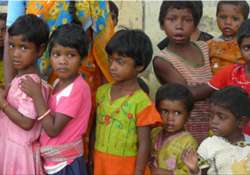Vulnerable children seek promises from political parties
New Delhi: Vulnerable children from across the country Wednesday put together a manifesto seeking certain things for themselves in the promises made by political parties for the Lok Sabha polls.A vulnerable child is defined as

New Delhi: Vulnerable children from across the country Wednesday put together a manifesto seeking certain things for themselves in the promises made by political parties for the Lok Sabha polls.
A vulnerable child is defined as being under the age of 18 years and at high risk of lacking adequate care and protection.
Such children also do not have social safety networks to depend upon to manage the risk they are exposed to.
The manifesto came after a year-long campaign initiated by World Vision India, in partnership with 160 other organisations. The organisers conducted state-level assemblies of vulnerable children in 20 states.
"Children should be at the centre stage and given priority in the political agenda of the country so they get their rightful share. Children cannot vote, and thus the need to listen to them and address their issues. The onus is on political parties and candidates to factor in their demands," says Jayakumar Christian, CEO, World Vision India.
These children are approaching various political parties and their candidates across the country to take up their cause and listen to them.
Some key demands in the manifesto include health services in all villages, stopping of child marriage, enrolment of child labourers in schools and life imprisonment to people who abuse children.
A vulnerable child is defined as being under the age of 18 years and at high risk of lacking adequate care and protection.
Such children also do not have social safety networks to depend upon to manage the risk they are exposed to.
The manifesto came after a year-long campaign initiated by World Vision India, in partnership with 160 other organisations. The organisers conducted state-level assemblies of vulnerable children in 20 states.
"Children should be at the centre stage and given priority in the political agenda of the country so they get their rightful share. Children cannot vote, and thus the need to listen to them and address their issues. The onus is on political parties and candidates to factor in their demands," says Jayakumar Christian, CEO, World Vision India.
These children are approaching various political parties and their candidates across the country to take up their cause and listen to them.
Some key demands in the manifesto include health services in all villages, stopping of child marriage, enrolment of child labourers in schools and life imprisonment to people who abuse children.